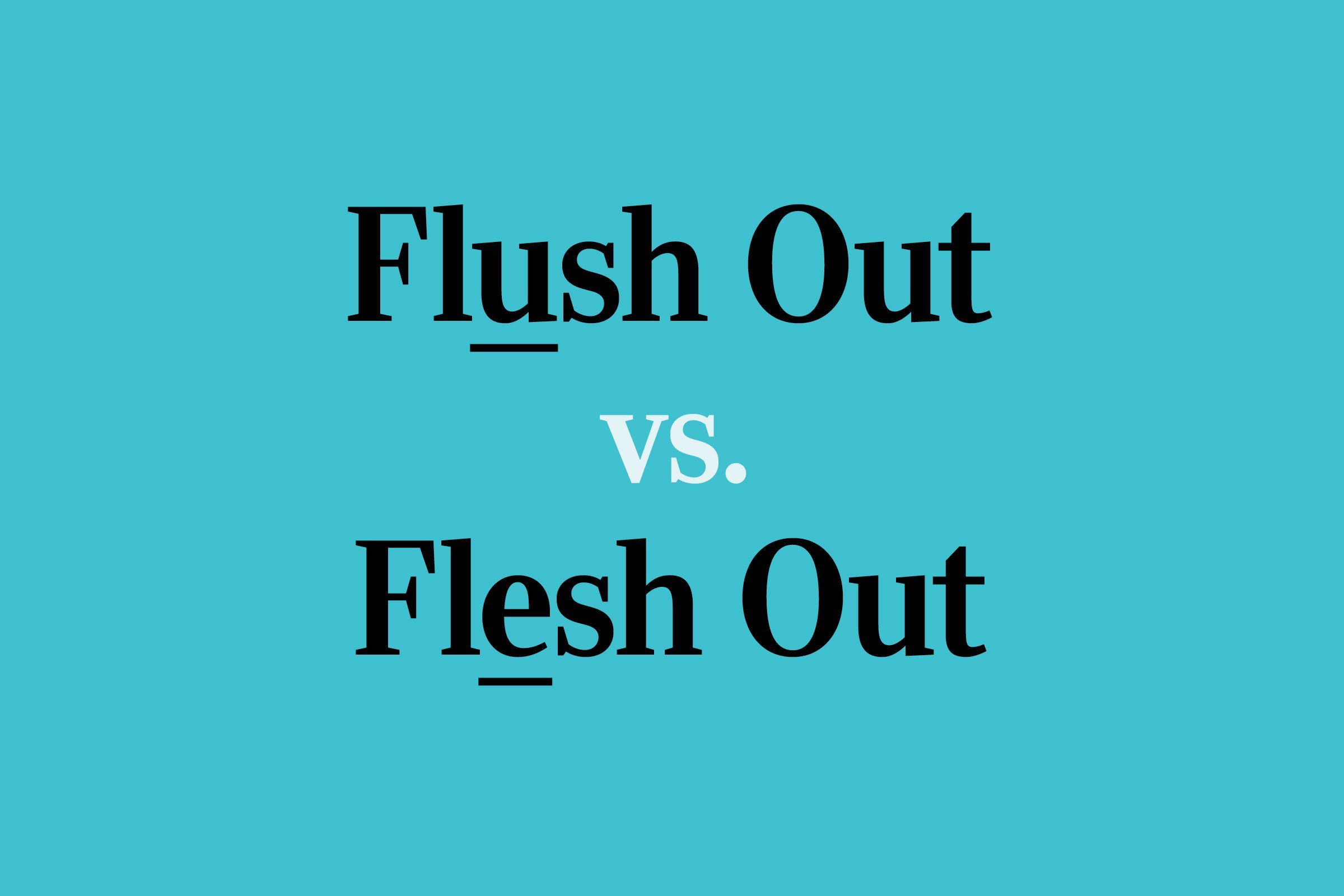Flesh out is about adding substance or details to something, while flush out is about revealing or forcing something out into the open.
Flush out and flesh out are two phrases that are often confused due to their similar sounds, but they have distinct meanings and uses in the English language.
What does flush out mean?
Flush out is a phrasal verb that means to force something or someone out into the open, typically by using strategies or actions intended to reveal or uncover hidden or concealed information. It is often used in the context of investigations, revealing the truth, or exposing something hidden.
Example sentences
- The detective worked tirelessly to flush out the identity of the anonymous tipster.
- The journalist's investigative report helped flush out corruption within the government.
- The detective hoped to flush out the suspect by releasing a false lead to the media.
- The police set up roadblocks to flush out the criminal who had been hiding in the city.
- The journalist's investigation aimed to flush out corruption within the government.
- The therapy sessions helped her flush out her suppressed emotions and traumatic experiences.
- The HR department conducted interviews to flush out the ideal candidate for the job.
- The spy agency used coded messages to flush out their undercover agents in enemy territory.
- The whistleblower decided to come forward to flush out the unethical practices happening in the company.
- The environmentalists organized protests to flush out the issues related to pollution and climate change.
- The team used surveys and questionnaires to flush out the opinions and preferences of the target audience.
- The truth eventually surfaced, helping to flush out the lies and deception that had been concealed for years.
What does flesh out mean?
Flesh out, on the other hand, is a phrasal verb that means to provide more details or substance to an idea, concept, or plan. It involves adding depth, context, or completeness to something that may be initially vague or incomplete.
Example sentences
- Let's flesh out the proposal with more data and examples before presenting it to the committee.
- The author needed to flesh out the characters in the novel to make them more relatable to readers.
- The architect needed to flesh out the design plans before construction could begin.
- The author spent weeks fleshing out the plot of the novel to create well-developed characters and a compelling storyline.
- Our brainstorming session helped us flesh out the initial concept into a comprehensive business proposal.
- The team worked together to flesh out the marketing strategy, adding specific tactics and timelines.
- The artist used various shades and colors to flesh out the details of the portrait.
- She asked her students to flesh out their essays with more examples and supporting evidence.
- The chef decided to flesh out the menu by adding a variety of vegetarian options.
- The director wanted to flesh out the backstory of the main character to make the film more engaging.
- The committee had to flesh out the budget to include all necessary expenses for the project.
- The scientist needed to flesh out the research findings in the report to provide a complete picture of the study.
Common idioms/phrases
The idiomatic expressions "flush out" and "flesh out" have different meanings and are used in distinct contexts. Here are common idioms and phrases that use each of these expressions:
Flush Out:
- Flush out of hiding: This phrase means to force someone or something to come out of hiding or to reveal their true intentions. For example, "The investigation aimed to flush out the hidden criminals."
- Flush out the details: This expression is used when you want to obtain more information or clarity about a situation. For instance, "We need to flush out the details of the project before we can proceed."
- Flush out the competition: This idiom is often used in business contexts, meaning to eliminate or surpass competitors in a competitive market or industry. For example, "Our marketing strategy is designed to flush out the competition."
Flesh Out:
- Flesh out an idea: This phrase means to develop or expand upon an idea by adding more details, explanations, or examples. It is used to make an idea more complete and understandable. For instance, "Let's flesh out this concept to make it clearer to the audience."
- Flesh out a character: In the context of storytelling, particularly in literature and scriptwriting, this expression is used to describe the process of giving depth and complexity to a character by providing background, motivations, and personality traits. For example, "The author took great care to flesh out the main character, making them relatable and engaging."
- Flesh out a plan: This idiom is used when you want to add more substance, details, or specifics to a plan or proposal. For instance, "We need to flesh out our marketing plan to include a comprehensive strategy."
- Flesh out the story: In the context of journalism or reporting, this phrase means to provide more information or context to a news story. For example, "The reporter worked to flesh out the story with interviews and additional research."
To differentiate between these two phrases, remember that "flush out" relates to revealing or exposing hidden information or entities, while "flesh out" pertains to adding depth or completeness to an idea or concept. Understanding this distinction is essential for using these phrases accurately and effectively in both written and spoken communication.
Discover more about the AI English proofreader, Engram!

Reference














